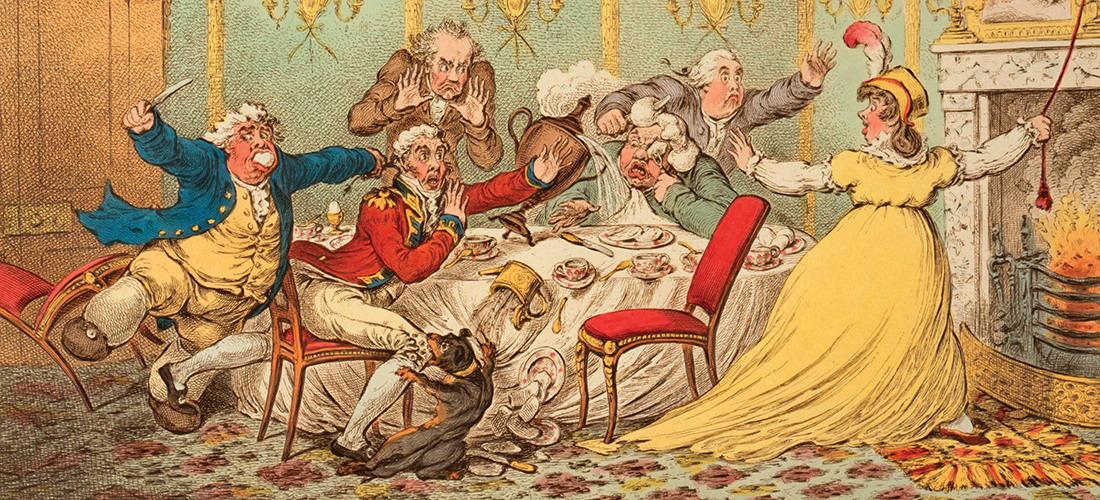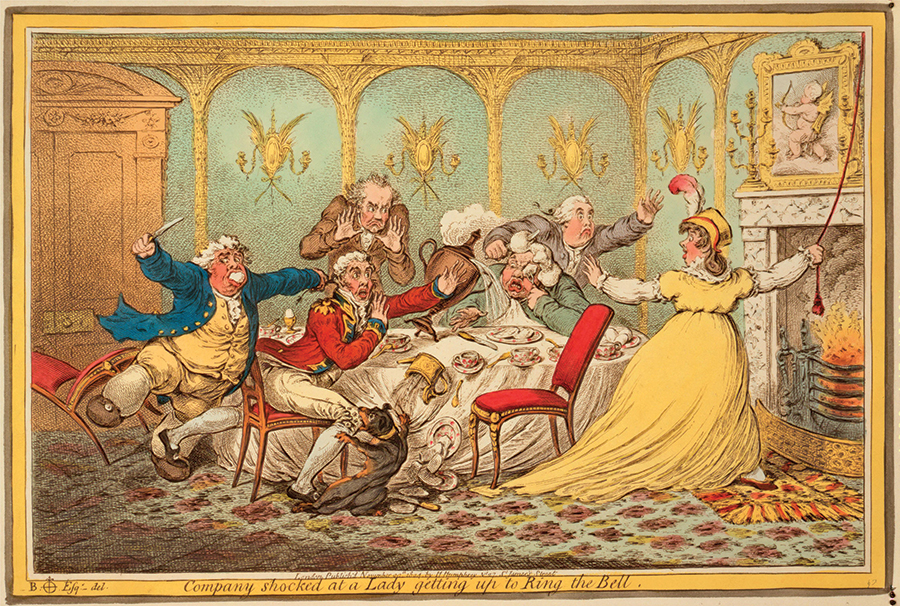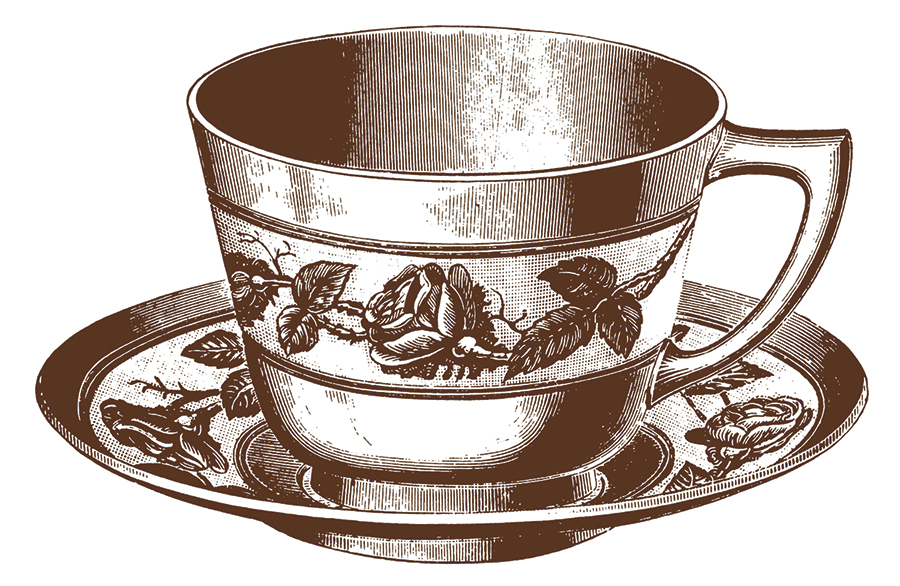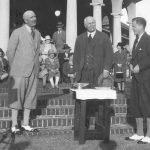
And a dancing bear
Fiction by Tony Rothwell
Ever since Sir Richard’s untimely death from a sudden stroke there had been an increasing number of enquiries of Lady Fiona as to how she was bearing up, did she need company, that sort of thing. They were kindly of course but, taking stock of those making the solicitations, it became clear that, while they had initially come from her relatives and lady friends, they were now beginning to emanate from gentlemen — single gentlemen. Indeed, when her period of mourning was over, it wasn’t long before the enquiries became invitations. And Fiona, who had at first consoled herself solely in the company of her faithful dog, Jack, found herself seriously considering the opportunities with which she was being presented.
Fiona was someone who loved life, but also someone who had not had what might be called a joyful marriage. It was true Richard had given her a title, a son (currently a soldier waging war against Napoleon in Europe), two well-found houses, one in the country, the other in the city, expensive jewelry and the latest clothes, but little by way of affection or even attention. He was always off with his friends or seeking influence among the aristocracy, leaving her to her own devices. To him she had been little more than an ornament, brought out when the occasion required.
But Fiona was not one to sit at home and wait to be ‘required.’ More and more she found amusement in the soirées of the likes of Georgiana, Duchess of Devonshire, and other members of the smart set in London — a group of aristocratic ladies who dressed in the height of fashion, wore the most exotic, bejeweled and befeathered wigs, and gambled and drank away their husband’s fortunes in a life close to dissipation. In addition, she had taken a cicisbeo*, who accompanied her to parties and other society events. Her choice had been a most willing, and amusing, rake — but she gave him up when Richard died. What was she to do now?
She consulted an old friend and confidante who told her in no uncertain terms, “You, my dear, are what all men seek — good-looking, humorous, well-preserved and well-off. Now that you have no ties, it’s high time you made a tour d’horizon, see what, or rather who, might be available. And you never know, you may find a true soulmate even yet.”
And so, over the next few months, Fiona had a remarkably full diary, accepting many of the invitations that came her way. But eventually, and inevitably, her more persistent suitors, of whom there were five, started to press their case for a more permanent arrangement, along with remarks designed to run down their competition whenever the opportunity arose. This took all the enjoyment out of the situation for Fiona and she realized something had to be done.
One rare evening when she found herself at home with nothing in her diary, she sat down with Jack on her lap to decide on a plan of action. As was her custom, she talked to her dog as though he were a person — he was, after all, very intelligent — and started by describing each of the suitors. Jack was all ears.
“First there’s Gilbert Blunt. A divorcee; rotund, gouty, but a man with something very definitely in his favour — he farms half of Buckinghamshire! The trouble is I always view divorcees as potentially faulty goods, but I have to say his gifts are very generous.
“Then there’s Andrew Duncannon. He’s a bachelor and a barrister. Not sure why he has become one of my favourites as he tends to be rather quiet, but he helped me greatly with Richard’s affairs when I needed it. And just when you least expect it, he utters a witticism or droll remark which never fails to make me giggle. And his pronouncements of affection seem very sincere.
“Next there’s Sir Edward Ponsonby. A retired Major. He is by far the most handsome of the five and I dare say we make a good-looking couple when I am on his arm, no doubt like many a lady before me. He is a bit of a braggard though, constantly regaling me with tales of his derring-do in battle. When he retired, he bought himself a seat in Parliament and is an up-and-comer in Pitt’s Tory Party. He does well on his political connections and service pension, or so he keeps telling me.
“Number four is Spencer Blanchard, a lonely widower if ever there was one. A man who has devoted himself to public service and is currently an Alderman of the City and widely thought to be a future Lord Mayor of London. So, what do you think, Jack, how would you like your mistress to be Lady Mayoress of London — rather grand, don’t you think?
“And lastly there’s Neville Carlisle, a bachelor and a fat one at that! He’s an Oxford don, highly intellectual and obviously lives very well. He dazzles me with his understanding of just about everything, but does he talk! He’s really not my type, but I find it very difficult to say no to him. It’s as though it would somehow reflect badly on my judgment if I did so. Perhaps I fear what he would say of me, but he can be quite sweet when he’s not being brilliant. So, there they are, Jack — my five suitors.”
Jack looked at her, his head cocked to one side in a questioning sort of way. “I suppose you want to know my favourite? Well, if I had to choose now, I would put Sir Edward in the first position and possibly Andrew Duncannon the second, but it’s very difficult — they are all suitable in their own way.”
As she looked down at Jack an idea began to take shape. Yes, that was it. She would arrange a tea party at home and invite them all, but in such a way that they would think that they were the only one being invited. For good measure she decided on April 1st as the date. She’d often had fun on April Fool’s Day, so why not? She didn’t know what would happen, but she felt something would come of it, and if nothing else, it would be very amusing.
She had the invitations delivered the very next day.

Lady Fiona Holland
invites you to take tea with her
on April 1st. at four o’clock in the afternoon
to discus matters of mutual interest.
R.S.V.P.
The invitations might as well have been fireworks for the explosive effect they had on each of the recipients. Each knew that this was it. What else could there be to discuss but their betrothal? Five affirmative replies flew back.
Gilbert Blunt started thinking about an expensive ring, “diamonds and rubies I think,” he mused. Major Ponsonby rehearsed a speech as though he were about to address Parliament, or was it his troops? Alderman Spencer Blanchard envisioned a grand reception in Guildhall with the Lord Mayor in attendance, and Neville Carlisle started to get excited about the coming joys of the wedding night.
Only Andrew Duncannon had doubts. It certainly sounded like there was a real chance for him, but after a few minutes of quiet reflection he had convinced himself that Fiona needed more advice on her late husband’s affairs. Yes, that was it, how silly of him to get ahead of himself like that.
Over the next two weeks, Lady Fiona turned down all invitations and left the suitors to their own devices. Of course, they were out and about and when occasionally they saw each other they seemed to be overflowing with bonhomie as they put on their best “I know something you don’t know” smiles, or passed each other with a cheery wave as much as to say, “You don’t know it yet, dear boy, but you have lost the prize.” Andrew Duncannon was very perplexed and was once on the point of asking Blunt why everyone seemed so friendly all of a sudden, but he decided to keep his thoughts to himself. Perhaps Fiona could shed light on it on April 1st.
The day finally came around and the five suitors converged on Lady Fiona’s London residence — three on foot, Carlisle and Blunt in carriages, and all dressed in their very best town clothes and wigs impeccably powdered, except for Duncannon who was damned if he was going to pay the guinea tax imposed lately on powder**.
But what was this? One by one they saw their competitors making for Fiona’s residence. They tried to remember the wording of the invitation. Perhaps they had misunderstood. No, they couldn’t have — it was very plain. Had they been tricked? No, Fiona wouldn’t do such a thing. Nothing for it but to go through with it. Meanwhile Duncannon was wondering about the complete and very sudden disappearance of the bonhomie so recently displayed. No one spoke a word. They just glowered at each other, feeling confused, uncomfortable and very put out.
Carlisle was nearest the door and rang the bell. The door was opened by the butler and there in the foyer stood Lady Fiona, dressed in the latest Paris fashion, a long flowing dress of saffron-colored silk with matching hat, complete with feather. She smiled broadly at each one as she invited them in. Carlisle, who was determined to be the first to kiss the hand of the hostess, advanced, but so did Blunt at exactly the same time. The result was that the two of them got stuck in the door which only served to emphasize their considerable girths. After a swallowed curse Blunt gave way. The afternoon was not getting off to a good start for Buckinghamshire or Oxford.
The rest followed into the foyer and Fiona led the way into her most elegantly appointed dining room. As a husband, Richard had been rather dull, but he had money and he allowed Fiona to spend it. In front of them was a table covered in beautiful china and platters of various tea-time foods, surrounded by six chairs. A painting over the fireplace of Cupid, complete with bow and arrows caught Ponsonby’s eye and set his heart racing.
Now, where were they to sit? There were no place cards.
All of them of course wanted to sit next to Fiona but while they were making their moves, it was Duncannon who stepped forward to hold a seat out for her which made the others seethe — an opportunity missed! Carlisle and Ponsonby immediately grabbed the seats on either side of her. Duncannon moved her chair in, and as the others sat down, he found the only seat left was behind a giant urn.
Lady Fiona bade them welcome, thanked them for coming and invited them to help themselves to tea; but it was not only muffins but also the atmosphere that could be cut with a knife. No one was making conversation. They looked a bit like children at their first birthday party. Suddenly it seemed, all these gentlemen didn’t know how to behave. Fiona, ever the hostess and not insensitive to the situation, broke the ice saying how mild the weather had been and where were those April showers? Upon which Carlisle began a long treatise on trends in temperatures he had been studying for the last 20 years and “don’t you know each year we are experiencing lower average temperatures,” at which Blunt interrupted saying that’s what must be affecting the yield from his thousands of acres of wheat, while Ponsonby interjected that farmers were asking far too much of the government in this time of war, as he was remarking to the Prime Minister only the other day, when Blanchard cut in with a statement that essential food costs were out of control in London and what he wanted to know was, what was Pitt proposing to do about that?

At this point, manners completely went out of the window with everyone barking over and at each other as though Fiona wasn’t even present. She filled her lungs and bellowed “WOULD ANYONE CARE FOR SOME RUM AND WALNUT CAKE?”
The room instantly fell silent except for Carlisle, who was still droning on about his temperature theories. But the others piped up with “Oh, yes, absolutely,” “indeed good lady,” “if you please,” “just a small piece perhaps,” “delicious tea,” they chorused, suddenly embarrassed by their show of ill-manners.
At that Fiona got up out of her chair and made towards the bellpull to summon the cake.
This was a signal for each of them to raise themselves out of their chairs and hurry to render her a service — no lady should be pulling bellpulls when there were five gentlemen present. As each did so, he realized that he was not the only one with the same thought and the matter then took on the form of a race to the bell — with disastrous results. Blunt fell, having tripped over Ponsonby’s foot, Spencer shot up and somehow impaled Blunt’s wig on his knife causing Carlisle to poke a muffin into his eye while Ponsonby, who had trodden on Jack’s paw, let out an ear-splitting howl as the dog sunk his teeth into the major’s knee. Meanwhile china and cutlery, muffins and eggs, were scattering in all directions, the teapot went flying and the urn was overturned. The gallant suitors then realized that they were, in any case, too late to assist Fiona, as one last china cup fell to the floor with an expensive crash.
Quiet descended on the room, broken in turn by a whimper from Ponsonby, a curse from Carlisle, an apology from Blanchard and an unfortunate noise from Blunt. Duncannon meanwhile picked up the urn and put its lid back on.
The cook and a maid, hearing the cacophony, came running in, the cook carrying the rather delicious-looking rum and walnut cake which she set on the table, while the maid started to clear up the debris. At this point, the gentlemen realized the best thing for them to do was retreat and enjoin the battle for Fiona’s hand on another occasion. They moved towards the door muttering “so sorry, have to go, Fiona,” “appointment in the city,” “vote in the House,” “need attention for my eye,” “my knee” and so on. Fiona, suppressing a smile, thanked them for coming, tried to apologize to Ponsonby for Jack’s behavior, and said goodbye as she watched their backs disappear into the foyer. Only Andrew Duncannon stayed to help clear up the devastation.
When they had brought the room to some sort of order, Fiona offered him a piece of the rum and walnut cake. “At least that didn’t perish in the fray,” she said. “Did you ever see such a thing, Andrew — will they ever forgive me? Will you ever forgive me? But it was funny, don’t you think? What will they say? I know I got you all here under false pretences, but I had no idea Armageddon would ensue, even though it is April Fool’s Day! Thank you so much for staying and clearing up, you are a dear and you seem to be the only one who came away unscathed.”
“It’s the least I could do Fiona, and if I may say so, it was the most entertaining thing I’ve seen since I witnessed a dancing bear, wearing a skirt, walking down Regent Street juggling coconuts.”
Fiona looked at him quizzically for a second, then realized what he had said, and broke out into peals of laughter, finally releasing the emotions bottled up over the last few months, not to mention the teatime debacle. “Andrew, you say the funniest things. You’re the only one who can make me laugh and I do love to laugh. I’m beginning to think you could steal my heart.”
“Really, Fiona, do you mean it? I’d walk down Regent Street wearing a skirt and juggling coconuts if you really did.”
“That won’t be necessary Andrew — just come here and give me a kiss.” PS
Historical Notes:
The print by James Gillray that inspired the story “Company shocked at a lady getting up to Ring the Bell” was published on November 20th, 1804.
* In the 18th century in England, convention accepted that ladies who had given their husbands a son and heir could take a cicisbeo (Italian for platonic lover) who provided sexual services and escorted them to events their husbands would not be attending, as long as the relationship did not interfere with their marriage.
** The Prime Minister of the day, William Pitt, imposed many taxes during this period to help pay for the expensive war against Napoleon. The names of the gentry who paid the guinea tax on powder for wigs were listed on a notice in their local church and became known as ‘guinea pigs’— the origin of the phrase we use to this day.
Bears were first introduced to Europe in the Middle Ages and proved to be a popular sideshow entertainment in countries where bears were not indigenous. There is no evidence of one being seen in Regent Street juggling coconuts, but we can dream.
Tony Rothwell moved to Pinehurst in 2017. He spent 50 years in the hotel business but in retirement collects caricatures, writes short stories and sings in the Moore County Choral Society.





